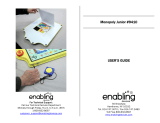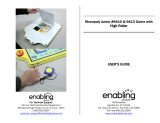
Each player
is
given
$1,500
divided
as follows:
P
each
of
$500s,
$100~
and
$50~;
6
$40~;
5 each
of
$105, $5~
and
$Is.
All remaining money and other equipment go to the Bank. Stack the
..
Bank's money on edge in the compartments in the plastic Banker's tray.
BANKER.
Select as Banker a player who will also
make a good Auctioneer A Banker who plays
~n the game must keep hislher personal funds
separate from those of the Bank. When more than
f~ve persons play, the Banker may elect to act only
as Banker and Auctioneer.
THE
BANK:
Besides the Bank's money, the Bank
holds the Title Deed cards and houses and hotels prior to purchase
and use by the players. The Bank pays salaries and bonuses. It sells
and auctions
properties
and hands out the~r proper Title Deed cards;
it sells houses and hotels to the players and loans money when
required on mortgages.
The Bank collects all taxes, fines, loans and interest, and the price of
all properties which it sells and auctions.
The Bank nwer "goes broke." If the Bank runs out of money, the Banker
may issue as much more as needed by writing on any ordinary paper.
THE
PLAY:
Starting with the Banker, each player in turn throws the dice.
The player with the highest total starts the play: Place your
token on the corner marked
"GO,"
throw the dice and move
your token in the direction of the arrow the number of
spaces indicated by the dice. After you have completed
your play, the
turn passes to the left. The tokens remain
on the spaces
qccupied and proceed from that point on
the player's next turn. Two or more tokens may rest on the
same space at the same time.
According to the space your token reaches, you may be entitled to
buy
real estate or other properties
-
or obliged to pay rent, pay taxes,
draw
a
Chance or Community Chest card, "Go to Jail," etc.
If you throw doubles, you move your token as usual, the sum of the
two dice, and are subject to any privileges or penalties pertaining to
the space on which you land. Retaining the dice, throw again and move
your token as before. If you throw doubles three times in succession,
move your token immediately to the space marked
"In Jail" (see JAIL).













